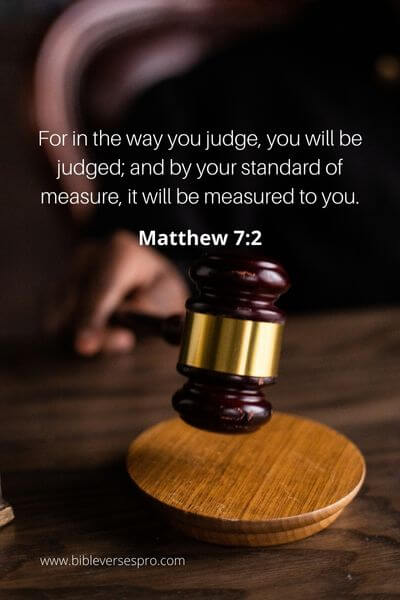The Bible has many verses about judging others and the importance of doing so righteously.
These 12 helpful Bible Verses about judging others righteously emphasize that as believers, we are called to judge others fairly, justly, and in line with God’s will.
The Bible teaches that while it is essential to judge others, we must do so with humility, wisdom, and love.
Bible Verses About Judging Others Righteously.
Reading these Bible verses will make you understand the nature of judgment and the importance of making judgments in a way that is consistent with God’s will.
Leviticus 19:15 – God wants us to be impartial in our judgment
‘You shall do no injustice in judgment; you shall not be partial to the poor nor defer to the great, but you are to judge your neighbor fairly.
Leviticus 19:15
This verse emphasizes the importance of judging others righteously.
It instructs believers not to show partiality or favoritism in judgment, whether for the poor or the rich, and to judge their neighbor fairly and justly.
This verse also highlights the importance of fairness when making judgments about others.
It serves as a reminder that, as believers, we are called to act in a way consistent with God’s justice and righteousness.
Deuteronomy 1:16 – We must always listen to both parties before the judgment
“Then I charged your judges at that time, saying, ‘Hear the cases between your fellow countrymen, and judge righteously between a man and his fellow countryman, or the alien who is with him.
Deuteronomy 1:16
When judging one another, we should always listen to both parties, not be one-sided and oblige the other to cut their word short.
Whoever you are judging, brother to brother or brother to a stranger, you should always feel right and not be partial.
This verse instructs us believers to be impartial in judging others. Our judgment shouldn’t come out of grudges or love towards another but should be according to the statement heard by both parties.
Deuteronomy 16:18 – Judges are necessary for good conduct
“You shall appoint for yourself judges and officers in all your towns which the Lord your God is giving you, according to your tribes, and they shall judge the people with righteous judgment.
Deuteronomy 16:18
Without law and judgment, the people in society will do whatever they want, leading to violence, crises, theft, and all dubious acts in the community.
God wants us to have judges who will also help protect the right of the citizens and a fair trial, and the judge appointed must always be impartial.
No matter the context, where there are no rules and regulations, there are bound to be misconduct among fellow citizen.
Many believers and churches fail differently because they all lack principles governing their actions and conduct.
Matthew 7:2 – We will be judged the same way we think others
For in the way you judge, you will be judged; and by your standard of measure, it will be measured to you.
Matthew 7:2
God had given us instructions to do onto orders what we want others to do to us.
It’s us here that as a judge you are, you should be fair in your judgment and not be partial; this verse reminds us that the same way we judge others, so will we be considered too.
This verse is related to judges and all Christians, who are in the position of giving advice and placing judges to be mindful of how they judge others.
John 7:24 – We shouldn’t judge people the way we see them
Do not judge according to appearance, but judge with righteous judgment.”
John 7:24
In the famous say of time and the past, it is said that do not judge a book by its cover.
The same applies in this verse; we have to give judgment on a critical review of one or a thing notwithstanding its appearance.
In the world of today, people tend to give a quick conclusion at first sight.
As believers, we are not to underestimate anyone if we want to place judgment.
The appearance or the attitude of someone shouldn’t make us place judgment on them; instead, we are to address the issues according to the event happening.
This verse also reminds us that if God were to judge us according to our appearance, most of us wouldn’t be alive today.
John 8:15 – We shouldn’t judge according to our perspective
You judge according to the flesh; I am not judging anyone.
John 8:15
thinking according to our flesh in this verse refers to judgment according to our point of view.
Jesus, in this verse, explains that people judge others based on their human standards and biases, but he, as God, does not do so.
Jesus also reminds us that we should not judge but leave judgment to God.
Luke 12:57 – We should judge what is right.
“And why do you not even on your own initiative judge what is right?
Luke 12:57
This verse encourages believers to judge with righteousness, be honest and impartial, and make decisions based on what is right and just.
This verse calls for individuals to take responsibility for their actions and to exercise sound judgment.
This passage also teaches us that we should be responsible for our actions and decisions and not rely on others to judge us.
John 7:51 – God doesn’t judge the way we think others
“Our Law does not judge a man unless it first hears from him and knows what he is doing, does it?”
John 7:51
This verse highlights the importance of fairness and impartiality in the legal process and the need to hear both sides of a story before passing judgment.
It is important to note that this verse refers to the context of the law and judges in legal matters, not personal opinions or prejudices.
As believers, we need to show a Christ-like example of not judging others carelessly or out of sentiment but also considering according to the cases presented.
Galatians 6:1 – We should advise others rather than judge them
Brothers, if anyone is caught in any transgression, you who are spiritual should restore him in a spirit of gentleness. Keep watch on yourself, lest you too be tempted.
Galatians 6:1
This passage talks about how believers should handle a fellow Christian in sin. It instructs them to restore that person gently and be careful not to succumb to temptation themselves.
As believers, we are to treat our fellow Christians with care and advise them when they do anything contrary to God’s will rather than judging them.
The passage also stresses that we should be gentle and careful when trying to help someone caught in sin.
Matthew 5:22 – We should be our brother’s keeper
But I tell you that anyone who is angry with a brother or sister will be subject to judgment. Again, anyone who says to a brother or sister, ‘Raca,’ is answerable to the court. And anyone who says, ‘You fool!’ will be in danger of the fire of hell.
Matthew 5:22 (NIV)
This verse emphasizes the value of treating people with respect and kindness rather than hostility and insults, even when you find them misbehaving.
This passage teaches us to be cautious with our words and to refrain from insulting or speaking out of anger because doing so will invite criticism.
Recommended posts.
Romans 14:10
You, then, why do you judge your brother or sister ? Or why do you treat them with contempt? For we will all stand before God’s judgment seat.
Romans 14:10 (NIV)
This verse reminds us that we will all have to account to God for our actions and words toward others; this verse addresses the problem of passing judgment on and treating others with contempt.
In this passage, Paul clarifies that we shouldn’t judge or despise others because we will all have to answer to God for our deeds.
This passage teaches us that since everyone will ultimately answer to God, we should not judge others and refrain from disparaging them.
It serves as a reminder to treat everyone with love, respect, and humility.
1 Corinthians 5:12
What business is it of mine to judge those outside the church? Are you not to judge those inside?
1 Corinthians 5:12 (NIV)
This verse addresses the problem of passing judgment on people inside and outside the Church.
Paul argues that since those outside the Church will be judged by God, it is not the Church’s responsibility to pass judgment on them.
However, believers must evaluate those who belong to the Church and ensure they uphold its tenets.
This passage teaches us that while we should not pass judgment on those who do not belong to our community, we are accountable for ensuring that those who belong to our community adhere to its teachings and principles.
Conclusion
The Bible teaches that those who follow Jesus are qualified to judge even trivial matters in this life and that they will take part in the final judgment of the world.
It also highlights how crucial it is to approach someone caught in sin with caution and gentleness.
It’s critical to remember that judgment has already been rendered in the end and that our job is to love and support others rather than judge them.

















